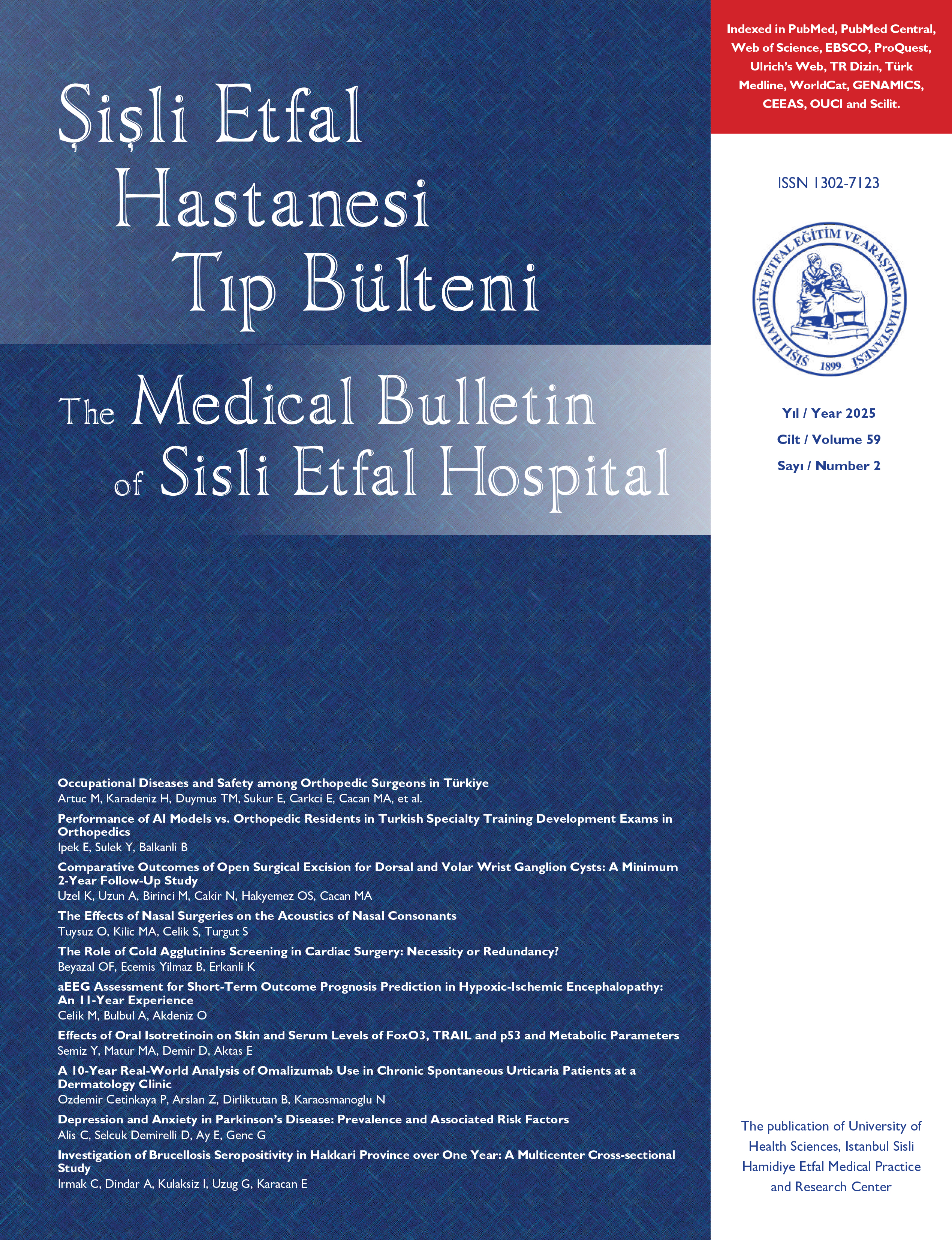
Evaluation of Depression, Self-esteem, Anxiety, and Dermatological Quality of Life Index in Adolescent Acne Patients: A Case-Control Study
Didem Kazan1, Burcu Bahar Inci2, Selin Ilchan3, Defne Ozkoca41Department of Dermatology and Venerology, Kutahya Health Science University, Evliya Celebi Training and Research Hospital, Kutahya, Türkiye; Department of Dermatology and Venerology, Istanbul Arel University, Istanbul, Türkiye2Department of Dermatology and Venerology, Kutahya Health Science University, Evliya Celebi Training and Research Hospital, Kutahya, Türkiye
3Department of Dermatology and Venerology, Kocaeli University, Kocaeli, Türkiye
4Department of Dermatology and Venerology, Zonguldak Ataturk State Hospital, Zonguldak, Türkiye
Objectives: Acne vulgaris is a common skin condition that affects adolescents and can have a significant impact on their mental health. In this study, we aimed to evaluate the depression and anxiety symptoms, self-esteem and dermatological quality of life indexes of adolescent patients with acne vulgaris.
Methods: A total of 160 patients aged between 10 and 19 years with acne vulgaris and 100 healthy controls were included in the study. All participants completed the Reynolds Adolescent Depression Scale (RADS), Beck Adolescent Anxiety Scale (BAAS), and Coopersmith Self-Esteem Survey Scale (CSES), alone and independently. The dermatologists evaluated the acne disease severity of the study group using the Global Acne Grading System, while the Children's Dermatological Quality of Life Index (CDLQI) was evaluated in the same group. Age, gender, and scale results of all participants were recorded on case report forms for further analysis.
Results: The study group had significantly higher RADS (27.5% vs 12.5%, p=0.003) and BAAS scores (80% vs 64%, p=0.001) than the control group. The percentage of patients with CSES scores below 20 in the study group was significantly higher than the control group (p=0.001). Higher RADS and BAAS scores were associated with higher CDLQI scores (p=0.001, p=0.001, respectively), while higher CSES scores were associated with lower CDLQI scores (p=0.001).
Conclusion: The study shows that acne vulgaris has a significant impact on the depression, anxiety, and self-esteem levels of adolescent patients. Dermatologists should pay attention to the psychological well-being of patients and provide psychiatric evaluation if necessary.
Adölesan Dönem Akne Hastalarında Depresyon, Benlik Saygısı, Anksiyete ve Dermatolojik Yaşam Kalitesi İndeksinin Değerlendirilmesi: Retrospektif Bir Vaka Kontrol Çalışması
Didem Kazan1, Burcu Bahar Inci2, Selin Ilchan3, Defne Ozkoca41Kütahya Sağlık Bilimleri Üniversitesi, Evliya Çelebi Eğitim ve Araştırma Hastanesi, Dermatoloji ve Veneroloji Kliniği, Kütahya; İstanbul Arel Üniversitesi, Dermatoloji ve Veneroloji Anabilim Dalı, İstanbul2Kütahya Sağlık Bilimleri Üniversitesi, Evliya Çelebi Eğitim ve Araştırma Hastanesi, Dermatoloji ve Veneroloji Kliniği, Kütahya
3Kocaeli Üniversitesi, Dermatoloji ve Veneroloji Anabilim Dalı, Kocaeli
4Zonguldak Atatürk Devlet Hastanesi, Dermatoloji ve Veneroloji Kliniği, Zonguldak
Amaç: Akne vulgaris (AV), adölesan dönemde sık görülen ve kişilerin psikolojik durumlarını etkileyebilen bir dermatolojik hastalıktır. Bu çalışmada adölesan dönemdeki akne vulgarisli hastaların depresyon ve anksiyete semptomlarının, benlik saygısı seviyelerinin ve dermatolojik yaşam kalitesi indekslerinin değerlendirilmesi amaçlandı.
Yöntemler: Çalışmaya yaşları 10-19 arasında değişen toplam 160 akne vulgaris hastası ve 100 sağlıklı kontrol dahil edildi. Tüm katılımcılar tek başlarına ve bağımsız olarak Reynolds Ergenler Depresyon Ölçeği (REDS), Beck Ergenler Kaygı Ölçeği (BEKÖ), Coopersmith Benlik Saygısı Araştırma Ölçeği'ni (CBSAÖ) tamamladı. Çalışma grubunun akne hastalık şiddeti, dermatoloji uzmanları tarafından Global Akne Derecelendirme Sistemi kullanarak değerlendirildi ve yaşam kalite indekslerininÇocukların Dermatolojik Yaşam Kalitesi İndeksi (ÇDYKİ) değerlendirildi. Tüm katılımcıların yaş, cinsiyet ve ölçek sonuçları daha ileri istatiksel analiz için vaka rapor formlarına kaydedildi.
Bulgular: Çalışma grubunun REDS (%27,5 vs %12,5, p=0,003) ve BEAS skorları (%80 vs %64, p=0,001) kontrol grubuna göre anlamlı derecede yüksekti. Çalışma grubunda CBSAÖ skoru 20'nin altında olan hastaların yüzdesi kontrol grubuna göre anlamlı derecede yüksekti (p=0,001). Daha yüksek REDS ve BEAS skorları daha yüksek ÇDYKİ skorları ile ilişkiliydi (sırasıyla p=0,001, p=0,001), daha yüksek CBSAÖ skorları ise daha düşük ÇDYKİ skorları ile ilişkiliydi (p=0,001).
Sonuç: Çalışmanın sonuçları akne vulgarisin adölesan hastaların depresyon ve anksiyete semptomları, benlik saygıları ve yaşam kalitesi düzeyleri üzerinde önemli bir etkiye sahip olduğu görülmektedir. Dermatoloji uzmanları adölesan akne hastalarının izlemlerinde, hastaların psikolojik iyilik hallerine dikkat etmeli ve gerekli durumlarda psikiyatrik değerlendirme için hastaları yönlendirmelidir. (SETB-2023-10-200)
Manuscript Language: English



















